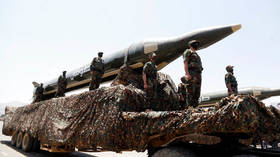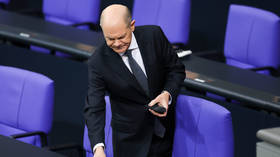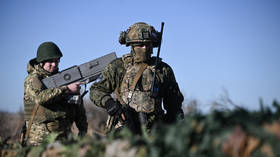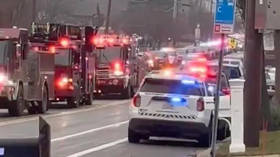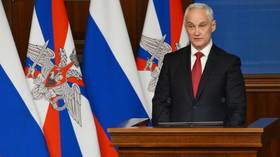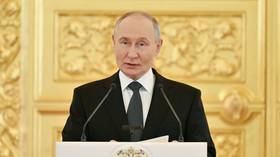Emmanuel Macron takes office as French president
Centrist Emmanuel Macron has officially assumed power in an inauguration ceremony at the Elysee Place in Paris, becoming the youngest president in French history.
His predecessor, socialist Francois Hollande, welcomed the 39-year-old at the steps of the presidential place during the red-carpet ceremony.
Macron won France’s presidential elections with 66.1 percent of the vote on May 7, while his rival Marine Le Pen received 33.9 percent.
Émotion immense #passationdepouvoirpic.twitter.com/VK8WdgU9on
— Axelle TESSANDIER (@axelletess) May 14, 2017
Hollande led Macron to the president’s office to discuss state secrets, including nuclear codes, as well as the most sensitive issues facing the Republic, the media reported.
The meeting took more than an hour, Le Parisien newspaper reported, adding that it had lasted longer than the usual 20-30 minutes.
Passation de pouvoir. pic.twitter.com/1TAFSWEok5
— Sacha Houlié (@Sach_He) May 14, 2017
The president of the Constitutional Council, Laurent Fabius, announced the official result of France’s election at Elysee palace.
“This May, the French people have chosen hope and the spirit of conquest… and I thank them. We need a strong France,” said Macron, speaking at the ceremony.
Cérémonie d'installation d'@EmmanuelMacron, Président de la République pic.twitter.com/oJL2zs8sHa
— Élysée (@Elysee) May 14, 2017
Macron has already announced the names of several people who are to join his presidential office. Alexis Kohler will become the new Secretary General of Elysee palace, while Patrick Strzoda has been appointed as the Chief of Staff of Macron’s cabinet. Philippe Etienne and Ismael Emelien will join his team as diplomatic advisor and special advisor, respectively.
France has been largely divided during this presidential election campaign. Macron faced tough competition from Republican Francois Fillon, right-wing Marine Le Pen, and left-wing Jean-Luc Melenchon. The first round of elections on April 23 saw Macron and Le Pen ending up neck in neck, with 24.01 and 21.3 percent of the vote respectively, enabling them to advance to the second round.
Cérémonie d'installation d'@EmmanuelMacron, Président de la République pic.twitter.com/8z99errfK3
— Élysée (@Elysee) May 14, 2017
Two of Macron’s first-round rivals, Fillon and socialist Benoit Hamon, later announced they would vote for him in the second round. Following the first round, people across France staged rallies to denounce both candidates, insisting that neither was fit for the job. Teaming up on social media and on the streets, people carried banners and shouted “neither Macron, nor Le Pen.” Some demonstrators also called for a boycott of the run-off. A number of those rallies, including some in Paris, ended in clashes with police.
The result of the second round of elections was more definitive, however. Macron received 66.1 percent of the vote, while Le Pen garnered only 33.90. Nevertheless, the outcome was met with protests that saw some demonstrators carrying banners saying “not my president.”
Macron is planning to make his first official visit to German Chancellor Angela Merkel, an Elysee statement to the press says, as cited by the French media. The leaders will meet in Berlin on May 15.
Some analysts also appear to be skeptical about whether Macron will bring any real change to his country. According to former MI5 intelligence officer Annie Machon, Macron represents the European establishment, which is fearful of a popular revolt.
"Dès ce soir, je serai au travail. Vive la République, vive la France" @EmmanuelMacron#DirectPR 🇫🇷 pic.twitter.com/qUPPSEWFUr
— Élysée (@Elysee) May 14, 2017
“Former US President Barack Obama endorsed Macron; the EU endorsed Macron. They were very frightened about another popular revolt against the establishment. Macron is very establishment: the elitist universities in France, the fact that he was [France’s] Economy Minister,” Machon said.
Jean Bricmont, a Belgian political commentator, told RT that Macron is going to adhere to the policies of his predecessor.
“Macron is going to make the same foreign policy as Hollande, only worse, so it will be more [orientation] on Washington – whether he would get along with Trump, it’s a separate question – but it would be very anti-Russian, he would probably want to arm rebels in Syria,” he said.
Macron may also face a problem if he cannot secure a majority in the French parliamentary elections, which are due in June, French human rights and civil liberties activist Yasser Louati believes.
“Now the question is: How is he going to build a majority in parliament in order for him to be able to govern,” he told RT.


